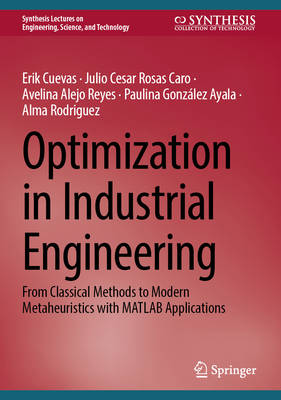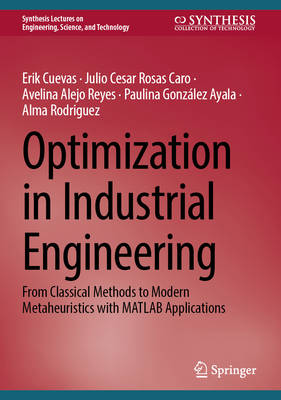
- Afhalen na 1 uur in een winkel met voorraad
- In januari gratis thuislevering in België
- Ruim aanbod met 7 miljoen producten
- Afhalen na 1 uur in een winkel met voorraad
- In januari gratis thuislevering in België
- Ruim aanbod met 7 miljoen producten
Optimization in Industrial Engineering
From Classical Methods to Modern Metaheuristics with MATLAB Applications
Erik Cuevas, Julio Cesar Rosas Caro, Avelina Alejo Reyes, Paulina González Ayala, Alma RodriguezOmschrijving
This textbook provides readers with a comprehensive exploration of optimization techniques in industrial engineering, with a specific focus on the Economic Order Quantity (EOQ) problem. It strikes a unique balance by thoroughly discussing the underlying concepts and theories, equipping the reader with the knowledge needed to develop their own programs for solving complex optimization problems in the field. A distinctive feature of this book is its extensive use of MATLAB implementations, which serves as a practical tool to bridge the gap between theory and real-world application. The book is structured with the understanding that learning is accelerated when theoretical concepts are complemented by practical, code-based problem-solving examples. This approach is particularly beneficial for students who may have a weaker background in mathematics, as it demonstrates the practicality and effectiveness of optimization in a more accessible manner. The inclusion of ready-made code examples not only makes the subject matter more engaging for students but also encourages them to experiment, modify, and enhance the code with their own ideas. This method of learning is designed to be less daunting and more stimulating, particularly for those who might feel overwhelmed by the prospect of developing complex programs from scratch. The book's approach is aimed at demystifying the complexities of optimization in industrial engineering, making it more approachable and interesting for students and practitioners alike.
Diverging from other texts that primarily focus on classical techniques for addressing optimization problems in industrial engineering, this book sets itself apart by delving into modern metaheuristic methods. Metaheuristic techniques have gained recognition for their efficacy in tackling complex problems that are often laden with diverse and challenging constraints. These methods, which include algorithms such as simulated annealing, and particleswarm optimization, offer a more dynamic and flexible approach to finding solutions compared to traditional methods. They are particularly adept at navigating vast search spaces and identifying optimal or near-optimal solutions in scenarios where conventional approaches might struggle. This inclusion of metaheuristic methods gives the book a unique quality, providing readers with a comprehensive understanding of both the established foundations and the cutting-edge advancements in the field of optimization. The book's exploration of these advanced techniques not only broadens the reader's knowledge base but also equips them with the tools to effectively solve more intricate and nuanced problems encountered in industrial engineering. This dual focus on classical and modern methods positions the book as a valuable and forward-thinking resource in the realm of industrial optimization.
Specificaties
Betrokkenen
- Auteur(s):
- Uitgeverij:
Inhoud
- Aantal bladzijden:
- 217
- Taal:
- Engels
- Reeks:
Eigenschappen
- Productcode (EAN):
- 9783031740268
- Verschijningsdatum:
- 16/01/2025
- Uitvoering:
- Hardcover
- Afmetingen:
- 168 mm x 240 mm
- Gewicht:
- 584 g

Alleen bij Standaard Boekhandel
Beoordelingen
We publiceren alleen reviews die voldoen aan de voorwaarden voor reviews. Bekijk onze voorwaarden voor reviews.









